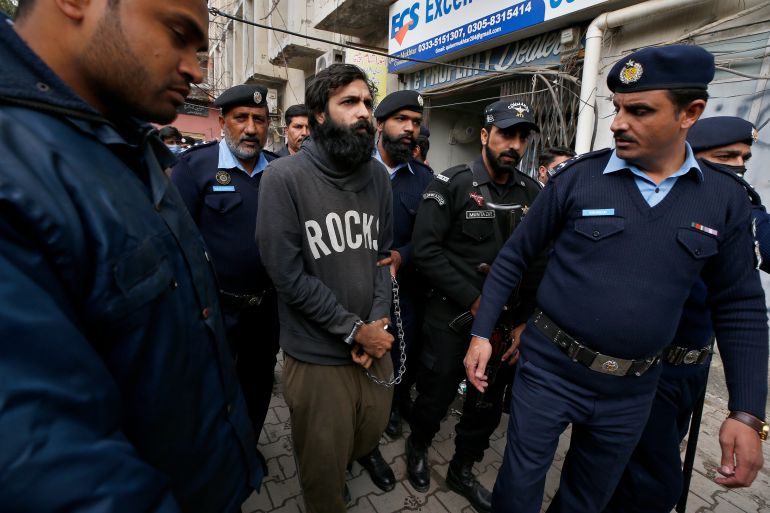Pakistan: In high-profile case, Mukadam killer sentenced to death
Zahir Jaffer was convicted of murdering 27-year-old Noor Mukadam after she refused to marry him.

Islamabad, Pakistan – A Pakistani court has convicted and sentenced a man to death for the murder, rape and beheading of a woman in the capital, Islamabad, last year.
The case shocked the nation and prompted widespread protests calling for greater rights for women in a country where violence against them has been described as “endemic”.
Keep reading
list of 3 itemsPakistan mob lynches man over blasphemy allegation: Police
Dreaming of escape: The Pakistani women fleeing domestic violence
Judge Muhammad Atta Rabbani convicted and sentenced Zahir Jaffer to death for the murder of Noor Mukadam during court proceedings on Thursday.
The court also sentenced two members of Jaffer’s household staff to 10 years in prison each for abetting the murder and confining Mukadam.
A number of others accused of abetment, including Jaffer’s parents, were acquitted.
Police found the body of 27-year-old Mukadam at Jaffer’s residence in July last year with the initial police report indicating she had been “slaughtered” and suffered other injuries.
In his initial police complaint, Shaukat Mukadam, the victim’s father, said his “daughter has been brutally murdered with a sharp-edged weapon and beheaded”.
“The death sentence for Zahir Jaffer, this was very necessary,” said Shaukat outside the Islamabad courtroom. “I said time and again that this was not a case of my daughter, it is a question of all of Pakistan’s daughters.”
Crowds thronged the area outside the courtroom ahead of the verdict being delivered.
The case had gained national prominence, with the social media hashtag #JusticeForNoor widely used to condemn the killing and other acts of violence against women in the South Asian country.
The trial began in October with prosecutors, the following month, sharing grisly details from security camera footage at the scene of the crime that showed Noor had attempted to escape Jaffer’s residence by jumping out of a window on the first floor and staggering towards the main gate, where her exit was barred by a member of his household staff.
In his legal defence, Jaffer’s counsel had pleaded that the accused was mentally unwell, but the court ruled in January that a medical board would not be formed to adjudicate Jaffer’s mental state.
History of violence against women and girls
Rights groups have long decried Pakistan’s poor human rights record on protecting the rights of women and ending gender-based violence in the South Asian country, which ranks 130 out 189 countries on the UN’s gender inequality index.
“Violence against women and girls – including rape, murder, acid attacks, domestic violence, and forced marriage – remains a serious problem throughout Pakistan,” noted US-based rights group Human Rights Watch in its 2021 annual report.
In 2020, the independent Human Rights Commission of Pakistan (HRCP) recorded at least 430 cases of killings in the name of so-called “honour”, with 363 women killed in gender-based attacks.
According to survey data from the Organisation of Economic Cooperation and Development (OECD), at least 85 percent of Pakistani women “have experienced physical and/or sexual violence from an intimate partner at some time in their life”, the highest number worldwide.
A 2020 UK government document on gender-based violence in Pakistan describes the practice as “endemic”.
The death sentence given to Jaffer is subject to confirmation by the Islamabad High Court, an appellate court where he also has the right to appeal.
Shaukat, the victim’s father, said his family had still not decided whether they would appeal the acquittals awarded to several suspects.
“I expected that I would get justice, and praise be to Allah we have gotten justice and the main culprit has been sentenced to death,” Shaukat said. “As for the rest of the culprits we will see what happens [in terms of appeals].”